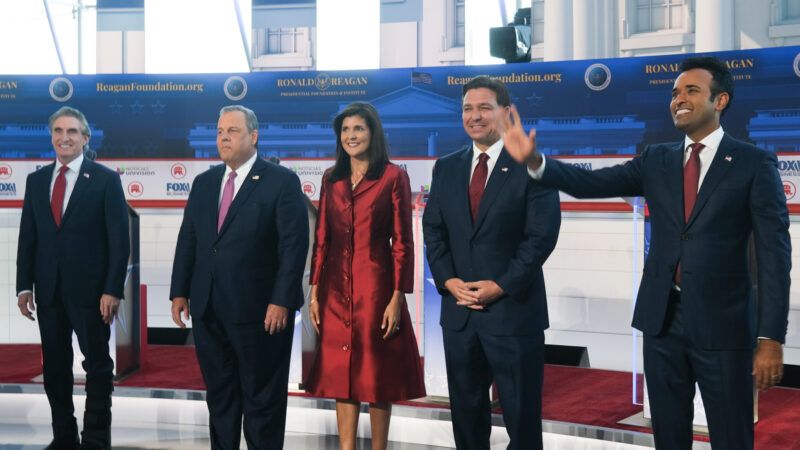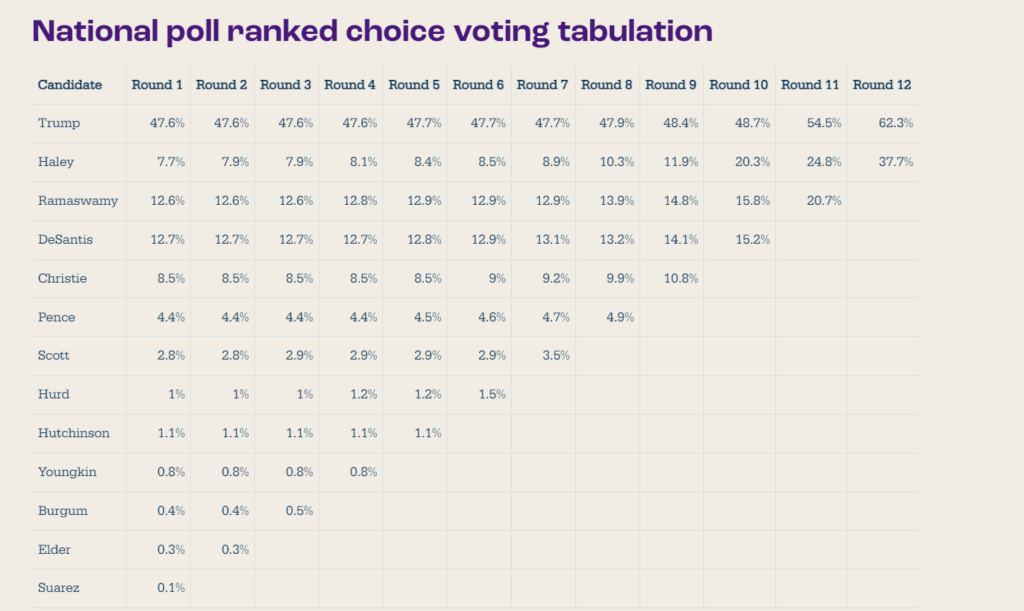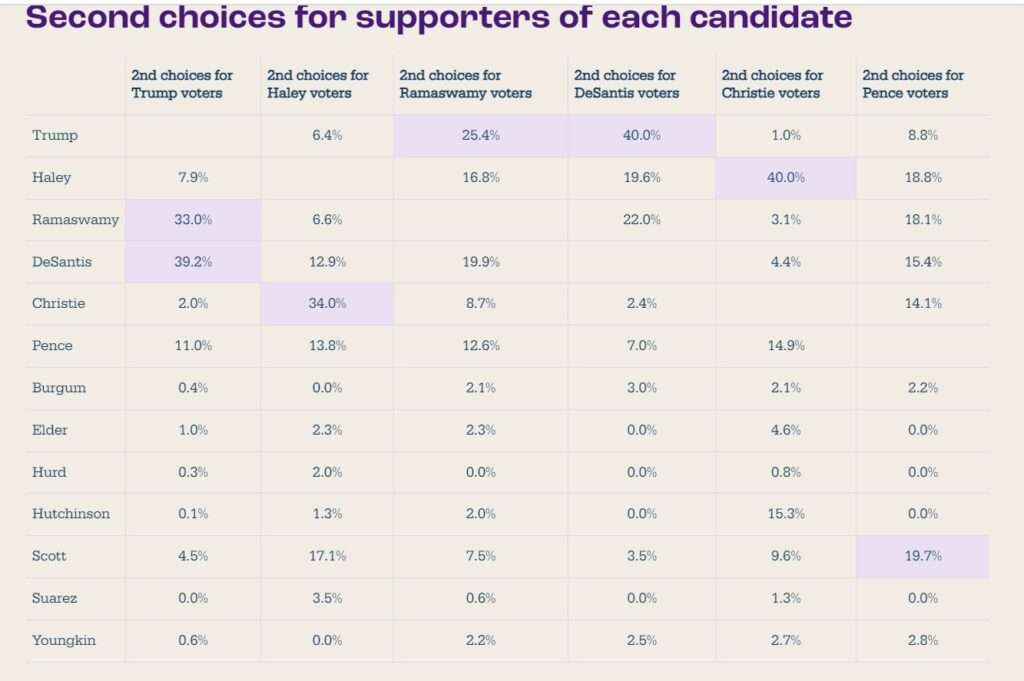How Ranked Choice Voting Would Sort the Republican Primary Field
Trump is still a runaway favorite, even when using a vote-counting technique that's meant to make it more difficult for unpopular candidates to win elections.

Despite the persistent wish-casting from anti-Trump Republicans, there's no mechanism by which the party could force underperforming presidential candidates to exit the primary.
But what if there were? What if the field could be narrowed so that only four, or three, or one challenger was taking on former President Donald Trump?
Well, Trump would still be the runaway favorite. But the process of winnowing away the weaker candidates reveals something interesting about the Republican field: It's not Florida Gov. Ron DeSantis who seemingly has the best chance of consolidating the anti-Trump vote. It's former South Carolina Gov. Nikki Haley.
That's the main takeaway from a unique poll of the primary field released Friday by FairVote, a nonprofit that advocates for the adoption of ranked choice voting. The survey included about 800 Republican primary voters and operated under the principles of ranked choice voting: each participant was asked to rank the GOP field from first to last, and the candidate who finished in last place in each round of vote-counting was eliminated, with their votes reassigned elsewhere depending on the respondents' preferences.
Ranked choice voting sounds a bit complicated, but, as Reason has explained before in more detail, it does a better job of translating the median voters' will into election results than the more widely used first-past-the-post system. Without ranked choice voting, a fractured field can result in a candidate winning despite getting far less than majority support—as was the case for Trump in most of the key primary states in 2016.
The best way to explain ranked choice voting is ultimately to see it in action, which is why this FairVote poll is so interesting. It includes 11 of the current Republican candidates as well as Virginia Gov. Glenn Youngkin, whom some Republicans would reportedly like to see get into the race, and Miami Mayor Francis Suarez, who dropped out in August.
Trump starts out with 47.6 percent of the vote in the first round, and he enjoys a robust lead of 34.9 percent over his closest rival, DeSantis.

Because the low-ranked candidates eliminated in the first few rounds have such a tiny sliver of the overall vote, there is little change in the top-line candidates until round seven. But look at how Trump's tally changes—or, rather, doesn't change—over those first several rounds. Their gains are marginal, but Trump's top six challengers all pick up a larger share of the redistributed vote than the former president does. In other words, they were ranked higher than Trump on the vast majority of the ballots that favored the bottom-feeding candidates.
Things get really interesting after former New Jersey Gov. Chris Christie is eliminated in round nine. The bulk of his support flows to Haley, who surges into second place with 20.3 percent of the total.
At that point, Haley had gained 12.6 percentage points from voters who chose eliminated candidates ahead of her. Meanwhile, entrepreneur Vivek Ramaswamy has gained 3.2 percentage points and DeSantis has gained 2.5 percentage points. Trump has gained just 1.1 percentage points and still sits below the 50 percent threshold.
In short, for Republican voters who did not list Trump first on the ballots, the former president is mostly ranked below the likes of Haley, Ramaswamy, and DeSantis. Trump finally gains some significant votes—more than enough to hold off Haley—once DeSantis and Ramaswamy are eliminated, though Haley also gains a sizable share from each of them.
The Republican presidential primary is not, of course, a single electoral contest and is not decided via ranked choice voting. It's a monthslong series of separate, mostly first-past-the-post elections in each of the 50 states (plus the territories and Washington, D.C.), and the results in some places bear only indirect consequences on what might happen elsewhere. The field will certainly contract at some point, but when and how that will happen are unpredictable.
At first blush, the poll suggests that a sudden contraction of the Republican field might leave open the possibility that another candidate can consolidate enough support to take on Trump one-on-one. The New York Times' Ross Douthat wrote last week about a similar outcome from the long-shot possibility of a Haley-DeSantis alliance: "If Haley or (less plausibly) Scott comes in second and DeSantis falls to third, the Florida governor should drop out and endorse the winner. If DeSantis wins but Haley is leading in New Hampshire, then he should offer a place on his ticket, and she should accept."
But a closer look at the FairVote poll indicates even that highly unlikely outcome probably wouldn't stop Trump. For all his difficulty in attracting support from voters who prefer the also-rans at the bottom of the field, Trump remains the most popular "second choice" for voters who have DeSantis and Ramaswamy as their favorites.

Any significant consolidation along the lines of what Douthat suggests would require that Ramaswamy drop out, at a minimum. It might require that DeSantis bails too. And no matter how stirring of an endorsement speech the Florida governor might be able to muster, it seems unlikely that the bulk of his voters would swing to Haley over Trump.
There's a long way to go and many things can still change, of course. National polls are largely meaningless anyway.
But the FairVote poll does a novel job of describing the conundrum facing the Republican Party: Trump will only lose the nomination if his supporters abandon him, no matter how unpopular he remains with the rest of the party. Indeed, even when using a vote-counting technique that's meant to make it more difficult for unpopular candidates to win elections, Trump is winning bigly.


Show Comments (185)